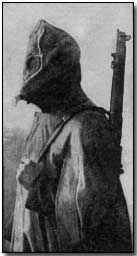Primary Documents - Geneva Protocol, 17 June 1925
 With the
Allies emerging victorious from World War One there was a desire to reaffirm
the pre-war principles forbidding the use of chemical weapons during
wartime, although provisions existed in the
Versailles Treaty
banning Germany from either manufacturing or importing such weapons.
With the
Allies emerging victorious from World War One there was a desire to reaffirm
the pre-war principles forbidding the use of chemical weapons during
wartime, although provisions existed in the
Versailles Treaty
banning Germany from either manufacturing or importing such weapons.
The U.S. took the lead at the Washington Disarmament Conference in 1922 in proposing a treaty governing the use of submarines and noxious gases. While the Senate passed the treaty without a dissenting vote the French government objected to its submarine provisions. The treaty thus never entered into force (French ratification being necessary).
Once again at the 1925 Geneva Conference for the Supervision of the International Traffic in Arms the U.S. government took an active stance in seeking to prohibit the export of gases for use in war. France suggested that a protocol be drawn up on non-use of poisonous gases; at Poland's suggestion the prohibition was extended to bacteriological weapons.
The protocol was signed on 17 June 1925. In the years prior to World War Two most major powers ratified the protocol, except the U.S. and Japan. The British reserved the right to waive the protocol if in time of war their enemies were to disregarded the terms of the agreement.
Protocol for the Prohibition of the Use in War of Asphyxiating, Poisonous or Other Gases, and of Bacteriological Methods of Warfare
Opened for signature: 17 June 1925, entered into force: 8 February 1928
The undersigned Plenipotentiaries, in the name of their respective governments:
Whereas the use in war of asphyxiating, poisonous or other gases, and of all analogous liquids, materials or devices, has been justly condemned by the general opinion of the civilised world; and
Whereas the prohibition of such use has been declared in Treaties to which the majority of Powers of the world are Parties; and
To the end that this prohibition shall be universally accepted as a part of International Law, binding alike the conscience and the practice of nations;
Declare:
That the High Contracting Parties, so far as they are not already Parties to Treaties prohibiting such use, accept this prohibition, agree to extend this prohibition to the use of bacteriological methods of warfare and agree to be bound as between themselves according to the terms of this declaration.
The High Contracting Parties will exert every effort to induce other States to accede to the present Protocol. Such accession will be notified to the Government of the French Republic, and by the latter to all signatories and acceding Powers, and will take effect on the date of the notification by the Government of the French Republic
The present Protocol, of which the English and French texts are both authentic, shall be ratified as soon as possible. It shall bear to-day's date.
The ratifications of the present Protocol shall be addressed to the Government of the French Republic, which will at once notify the deposit of such ratification to each of the signatory and acceding Powers.
The instruments of ratification of and accession to the present Protocol will remain deposited in the archives of the Government of the French Republic.
The present Protocol will come into force for each signatory Power as from the date of deposit of its ratification, and, from that moment, each Power will be bound as regards other Powers which have already deposited their ratifications.
In witness whereof the Plenipotentiaries have signed the present Protocol.
Done at Geneva in a single copy, the seventeenth day of June, One Thousand Nine Hundred and Twenty-Five.
A "gutzer" was slang for a stroke of bad luck.
- Did you know?
